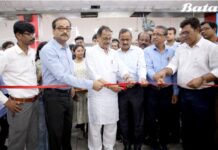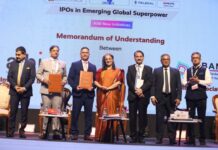Fujitsu marks milestone as it embarks on global rollout of multi-cloud support center
Tokyo, March 30, 2019: Fujitsu Limited has presented an analysis of the impact of digital transformation on mobility services, outlining megatrends and business opportunities. The company has compiled these insights into a report, entitled ‘Fujitsu Future Insights The Future of Mobility’. A short animated movie accompanies the report to illustrate how the future of mobility will support the daily lives of people.
The Fujitsu Future Insights series looks at global trends of digital transformation, providing deeper analysis of challenges and the impact of technologies in specific industry areas. It also offers suggestions for possible future scenarios and strategies related to those areas. In ‘The Future of Mobility’, Fujitsu describes its vision for the future of digitalized mobility services, and shows how it remains uniquely positioned to realize the co-creation of new mobility services, particularly in the auto industry and adjacent industries.
Through its efforts as a digital transformation partner to its customers, Fujitsu demonstrates its continued commitment to co-creation with its partners in a variety of fields, ultimately contributing to the achievement of a more sustainable, fulfilling society for all.
Background
In recent years, digital technology has started to rapidly transform the landscape of the automotive sector. This includes recent trends toward greater connectivity, autonomous driving, and a move away from gasoline-driven vehicles toward battery-powered ones, as well as a shift from ownership to sharing. Open innovation is becoming more widespread, and innovative solutions and new services are co-created by organizations that hold different sets of expertise.
Through its co-creation with different players throughout the world across many industries, Fujitsu continues to contribute to a sustainable mobility society that promises to enrich our lives. In the Future of Mobility report, Fujitsu introduces its view on megatrends in the mobility space and how technology can contribute to the realization of the future of mobility as follows.
Summary of The Future of Mobility
Mobility for Humanity Looking back on history, the movement of people has led to the creation and development of new civilizations, cultures, and industries. In the past, this trend gave birth to technologies like the train and automobiles, which led to the development of new means of transporting ever greater volumes of people and things at ever greater speeds in each different mobility industry. Currently, and in the immediate future, organizations that are traditionally segregated into different industries – automobile, transportation, logistics, electric utilities, and the like – will form new autonomous and distributed ecosystems connected via digital technologies, together creating a human centric mobility society.
Megatrends of Mobility Introducing six emerging megatrends of mobility to achieve sustainable economic growth and solve difficult societal issues by creating diversified mobility services:
– “Urbanization of mobility”: Re-invention of cities by mobility
– “Democratization of mobility”: Mobility that everyone can use and provide
– “Robotization of logistics”: Mobility without human intervention
– “Mobility as experience”: Making movement more fun and appealing
– “Moving without moving”: Mobility that replaces physical movement
– “Mobility in natural ecosystems”: Mobility coexisting with our planet
Fujitsu and the Future of Mobility Using advanced digital technology, Fujitsu is working to realize a human centric mobility future focusing on the following three areas.
Collecting Technology to store the raw data generated by automobiles in a distributed manner and technology to make the image data lighter enable significant cost reduction for communicating and storing the data.
Connecting Enable downloads and updates of vehicle software via wireless networks to ensure safer and secure mobility.
Utilizing A digital twin platform for the mobility sector will enable the virtual modeling of things and events in the physical world, using data collected from vehicles and other external sensors. This technology will contribute to improving the quality of simulations and enhance various functions of vehicles. These technologies will facilitate a rapid, high-precision evaluation of automobile quality during the development process.
Corporate Comm India(CCI Newswire)





























